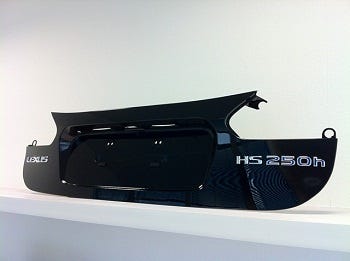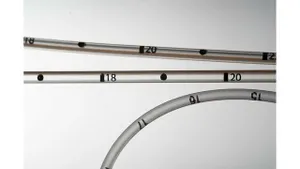Polycarbonate/polyester alloy promises ultra-smooth surfaces in auto applications
An alloy of polycarbonate and polyester is said to combine unprecedented dimensional precision and an ultra-smooth surface for automotive applications.
July 5, 2012
An alloy of polycarbonate and polyester is said to combine unprecedented dimensional precision and an ultra-smooth surface for automotive applications.
Developed by jointly by Teijin Chemicals (Tokyo, Japan) and Toyoda Gosei Co. Ltd. (Kiyosu, Japan), Panlite AM-9937F enables product designs that were previously unachievable due to the limitations of conventional metal according to the developers. The company plans to market the material for external automotive body parts and garnish, and expects to achieve annual sales of 10 billion yen ($125 million) by fiscal 2020.
|
Lexus luggage door garnish is one of the first applications of polycarbonate/polyester. |
Panlite AM-9937F's key performance features include processability, design flexibility, and high resistance to impact, heat and corrosion, as well as a low linear expansion coefficient. The lightweight material will reportedly also enable automobile manufacturers to reduce the weight of components by about 20% compared with metal. Recently it has been adopted for the luggage door garnish on the Lexus HS250h hybrid sedan.
The automotive industry has prioritized vehicle weight reduction and improved fuel efficiency amid increased concerns about global warming and fossil fuel consumption. There has been a growing trend of using of plastics instead of glass and metal to reduce the weight of automotive parts such as windows, frames, and body components. To date, various resins, particularly polycarbonate, have been widely used for parts like door handles and hubcaps, but as the demand for lighter vehicles increases, manufacturers are expected to utilize resins for larger parts, including rear doors and fenders, ensuring a robust market for Teijin Chemical's new resin. —[email protected]
About the Author(s)
You May Also Like



